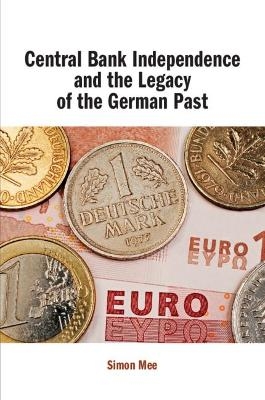
Central Bank Independence and the Legacy of the German Past
Seiten
2021
Cambridge University Press (Verlag)
978-1-108-73130-0 (ISBN)
Cambridge University Press (Verlag)
978-1-108-73130-0 (ISBN)
This is a study of how German monetary history – in the form of the lessons learned from Germany's experience of inflation in 1922–3 and 1936–45 - became politicised in the post-war era and transformed into a political weapon in debates surrounding the establishment of West Germany's central bank and who should control monetary policy.
The 2008 financial crisis led to more and more frequent political attacks on central banks. The recent spotlight on central bank independence is reminiscent of the fiery debates amongst Germany's political elites in 1949 on the same issue; debates that were sparked by the establishment of West Germany in that year. Simon Mee shows how, with the establishment of West Germany's central bank - today's Deutsche Bundesbank - the country's monetary history became a political football, as central bankers, politicians, industrialists and trade unionists all vied for influence over the legal provisions that set out the remit of the future monetary authority. The author reveals how a specific version of inter-war history, one that stresses the lessons learned from Germany's periods of inflation, was weaponised and attached to a political, contemporary argument for an independent central bank. The book challenges assumptions around the evolution of central bank independence with continued relevance today.
The 2008 financial crisis led to more and more frequent political attacks on central banks. The recent spotlight on central bank independence is reminiscent of the fiery debates amongst Germany's political elites in 1949 on the same issue; debates that were sparked by the establishment of West Germany in that year. Simon Mee shows how, with the establishment of West Germany's central bank - today's Deutsche Bundesbank - the country's monetary history became a political football, as central bankers, politicians, industrialists and trade unionists all vied for influence over the legal provisions that set out the remit of the future monetary authority. The author reveals how a specific version of inter-war history, one that stresses the lessons learned from Germany's periods of inflation, was weaponised and attached to a political, contemporary argument for an independent central bank. The book challenges assumptions around the evolution of central bank independence with continued relevance today.
Simon Mee is a former Theodor Heuss Research Fellow of the University of Oxford and Alexander von Humboldt-Stiftung. He studied at the University of Dublin, University of Cambridge and University of Oxford. His Oxford doctoral research about the Bundesbank went on to win the 2017 Ph.D. Prize of the German Historical Institute, London.
Introduction; 1. In search of the Reichsbank; 2. The Bank deutscher Länder and the foundation of West Germany, 1948–51; 3. Adenauer's challenge: the 'Gürzenich affair' and the Bank deutscher Länder, 1956–7; 4. The shadow of national socialism: Karl Blessing and the Bundesbank in 1965; 5. The Bundesbank, social democracy and the era of the 'Great Inflation', 1970–78; Conclusion.
| Erscheinungsdatum | 14.05.2021 |
|---|---|
| Zusatzinfo | Worked examples or Exercises; 3 Tables, black and white; 13 Halftones, black and white |
| Verlagsort | Cambridge |
| Sprache | englisch |
| Maße | 150 x 230 mm |
| Gewicht | 530 g |
| Themenwelt | Geisteswissenschaften ► Geschichte ► Regional- / Ländergeschichte |
| Geschichte ► Teilgebiete der Geschichte ► Wirtschaftsgeschichte | |
| Wirtschaft ► Volkswirtschaftslehre ► Makroökonomie | |
| ISBN-10 | 1-108-73130-9 / 1108731309 |
| ISBN-13 | 978-1-108-73130-0 / 9781108731300 |
| Zustand | Neuware |
| Informationen gemäß Produktsicherheitsverordnung (GPSR) | |
| Haben Sie eine Frage zum Produkt? |
Mehr entdecken
aus dem Bereich
aus dem Bereich
Macht und Herrschaft im Zarenreich
Buch | Hardcover (2024)
C.H.Beck (Verlag)
CHF 69,85


